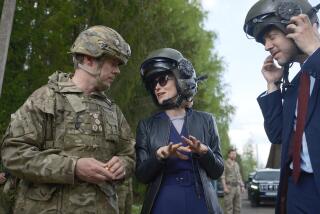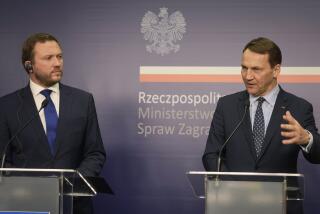Estonia Begins Secession Drive : Baltics: Republic announces plan to gradually break from Soviet Union. But it seeks to avoid Kremlin anger.
MOSCOW — The Kremlin’s woes in the Baltic suddenly doubled Friday when Estonian lawmakers decreed that Soviet law no longer applies in their republic and announced a step-by-step return to the independence snuffed out by the Red Army 50 years ago.
“The restoration of the Republic of Estonia has begun,” the Parliament of the Switzerland-sized republic proclaimed, its resolution immediately confronting President Mikhail S. Gorbachev with another fissure in the new “Soviet federation” he is trying to build.
The nearby Baltic homeland of Lithuania broke formal ties with Moscow on March 11 by a bold unilateral declaration of independence. Gorbachev has opposed that move as illegal and invalid and refused to open the negotiations sought by Lithuania’s secessionist leadership.
On Friday the confrontation continued, with the Lithuanian Information Office reporting that Soviet troops had occupied the printing plant for the government’s main newspapers, as well as the chief prosecutor’s office, where staff members refused to take orders from a new man appointed by Moscow earlier that day.
Soldiers previously had occupied a few Communist Party buildings.
Lithuanian President Vytautas Landsbergis said that the decision to take over the prosecutor’s office “brings shame on the Soviet Union,” the Associated Press reported from Vilnius, the capital.
“They are trying to destroy the legal system. We have had these challenges before. We have stood against them, and we will do it again,” Landsbergis said.
Moscow authorities also were certain to oppose Estonia’s action. But the Estonian legislators, saying they had learned a lesson from the Kremlin’s ire at the Lithuanians, took care to avert an open break by saying that independence is their final goal, rather than declaring it outright.
Nonetheless, 29 ethnic Russian members of the Parliament meeting in Tallinn, Estonia’s capital, protested by boycotting the vote, said Yuri Myerushte, an editor at the state-run Estonian Telegraph Agency. One deputy said the proclamation could lead to bloodshed.
“This constitutes a state coup d’etat, “ Vladimir Lebedev warned his fellow lawmakers during debate. “Think hard before voting whether by pushing the green button you are voting for civil war.”
“The Supreme Soviet (Parliament) does not recognize the legality of the state authority of the U.S.S.R. on the territory of Estonia,” declared the resolution, which was approved by 73 members of the 105-seat legislature, with three others abstaining.
It announced the “beginning of a period of transition which will culminate in the formation of the constitutional organs of state power of the Republic of Estonia,” the smallest and least populated of the three Baltic states that were independent between the world wars.
Lebedev and other leaders of the Russian-dominated Equal Rights Group bitterly attacked the independence resolution and warned they would appeal to the national Parliament.
Opponents of independence demanded the issue be decided by a referendum and not by Parliament, which the Soviets say also must be the case in Lithuania. But such thinking was rejected by the pro-independence majority that Estonian voters chose in this month’s parliamentary elections, the freest in the half-century of Soviet rule.
“Estonia is not part of the Soviet Union. It’s an occupied territory, so there cannot be a question of a referendum,” said Tiit Kabin, a leading radical deputy.
The northernmost of the Baltic states, Estonia was coerced into the Kremlin’s orbit in June, 1940, when it agreed under threat to allow Red Army forces to march in. Like Latvia and Lithuania, Estonia was deeded to the Soviet sphere of influence under the Nazi-Soviet Non-Aggression Pact, signed by the foreign ministers of Josef Stalin and Adolph Hitler in 1939.
Stalin henchman Andrei Zhdanov accompanied the Soviet troops to Tallinn to supervise the formation of a pro-Moscow government. In July, 1940, a “People’s Assembly” convened under the watchful eye of the soldiers and proclaimed a socialist government. Estonia joined the Soviet Union within three weeks.
Despite their outspoken advocacy of independence, leaders of the grass-roots Estonian People’s Front and other nationalist groups consciously elected not to follow the example of Lithuania, counseling a more gradual, legalistic tack.
“It’s quite clear that the Lithuanians made a crucial mistake: They humiliated a great power,” said deputy Mikk Titma, who quit last week as the Estonian Communist Party’s chief ideologue. “We are for a smoother step-by-step policy. We are calling for a transition period. Politically, it could be a year or so, but it could take three to five years to solve the economic and other problems.”
Nevertheless, the resolution puts the Estonians on a collision course with the Soviet leadership. Article 75 of the Soviet Constitution unequivocally says “the sovereignty of the U.S.S.R. extends throughout its territory,” whatever the Estonians maintain about the primacy of their own laws.
Moreover, Gorbachev has insisted that the Baltic republics await passage of federal legislation that would set terms for secession of any of the 15 constituent Soviet republics. Legislation also is making its way through the national legislature that would accord far greater leeway to the republics for decision-making, in line with Gorbachev’s vision of a new “Soviet federation.”
Arnold Ruutel, who was reelected Estonia’s president when the Parliament began its session Thursday, told reporters that he is confident that talks on Estonian independence would begin soon with the Kremlin. He said he expected that Anatoly I. Lukyanov, a Gorbachev protege who is chairman of the Soviet legislature, would head Moscow’s negotiating team.
Demographics play a big part in the Estonians’ go-slower approach. Estonians make up only 65% of the 1.6 million people who live in the republic, while Russians total 28%, Ukrainians 3% and Byelorussians 2%.
Those Slavic minorities are largely hostile to independence and would have to be convinced that their rights would be protected.
BUSH WRITES GORBACHEV: President tells Kremlin leader U.S. position on Lithuania. A12
More to Read
Sign up for Essential California
The most important California stories and recommendations in your inbox every morning.
You may occasionally receive promotional content from the Los Angeles Times.










